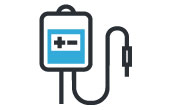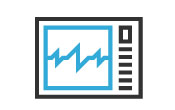Echocardiography
Using ultrasound waves to produce live images of your heart which shows the functioning of the heart and its valves
Consultation
What is Echocardiography?
Echocardiograms are ultrasound scans of the heart.
It is the most common cardiac imaging test because it is readily available and portable. Its excellent temporal resolution makes it the test of choice for assessing heart valve leakage (regurgitation) or narrowing (stenosis). There can be limitations in picture quality depending on several factors such as patient size and lung disease.
Dr Banypersad perform and report several types of echocardiography:
- Transthoracic Echocardiography
- Transoesophageal Echocardiography (Royal Blackburn Hospital only)
- Stress Echocardiography (Royal Blackburn Hospital only)

Insured?
Dr Banypersad is an authorised provider for all the major insurance companies, including BUPA (fee-assured).
All cardiac CT and MRI scans will take place at The Spire Manchester hospital.
Transthoracic Echocardiography
A hand-held probe is placed on the chest wall and ultrasound waves are transmitted several times per second through to the chest towards the heart and then returned to the probe, producing an image on screen. This is the commonest type and is the baseline test for assessing heart pumping function and valve disorders. Structural defects of the heart such as holes in the heart or abnormally thickened / thinned areas of the heart can often be identified. Patients with chest pain, breathlessness, palpitations and blackouts may benefit from this test or a cardiac MRI scan.
Transoesophageal Echocardiography
This is generally required to evaluate in more detail specific abnormalities that have been detected on transthoracic echocardiography. A flexible probe with the ultrasound scanner at the tip must be swallowed (under sedation) and an ultrasound scan of the heart is performed from the food pipe (oesophagus). As unusual as this may sound, the heart sits anatomically very close to the oesophagus and thus specific heart structures are generally seen with greater clarity. This test might be performed for example when evaluating the exact details of a leaking mitral valve (to aid surgical decision making) or perform precise measurements of holes in the heart (to assist with closure devices).
Stress Echocardiography
This is principally the same as transthoracic echocardiography but performed either during physical exercise (not always very practical) or more commonly during an intravenous infusion of a medication to make the heart beat harder and faster, as if it was exercising; this medication is called Dobutamine. Dobutamine is administered continuously in gradually increasing doses over the course of 10-15 mins and ultrasound scans of the heart are acquired every few minutes. A contrast agent is also administered intravenously to ensure optimal picture quality. This test is performed to assess whether any part of the heart starts to malfunction when being stressed, which may be an indicator of the presence of narrowings in the coronary arteries. The coronary arteries themselves cannot be seen during stress echocardiography.
Patients with chest pain may benefit from this test or a cardiac CT scan.
Any adult patient:
- Needing baseline assessment of heart structure and function
- With suspected angina (stress echocardiography)
- Detailed assessment of heart valves or masses in the heart (transoesophageal echo)
- Very large patients may not have adequate image quality
- Patients with severe arthritis / joint pains may not be able to lie in the appropriate positions to obtain images
- For stress echo:
- Occasionally, some patients with glaucoma may not reach the target heart rate
- Small risks associated with dobutamine infusions
- For TOE specifically:
- Need to be sedated so cannot drive for 24 hours after appointment
- Invasive procedure so carries small risks
Tests with Dr Banypersad

Cardiac MRI
A non-invasive test that uses an MRI machine to create magnetic and radiofrequency waves to show detailed pictures of the inside of your heart.

Cardiac CT
A heart-imaging test that uses CT technology with intravenous (IV) contrast (dye) to visualize the heart anatomy, and coronary circulation.

Echocardiography
A test that uses ultrasound waves to produce live images of your heart which show how your heart and its valves are functioning.

Appointment
Dr. Banypersad's associates will help you with these tests. Through an appointment best course of action can be advised.